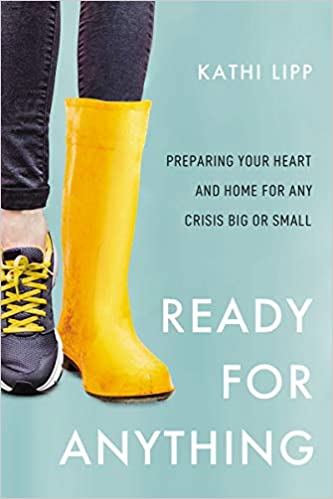Read along with the podcast!
Clutter Free Academy Podcast #397
How to Stay Focused
<<intro music>>
Kathi – Well, hey friends. Welcome to Clutter Free Academy, where our goal is to help you take small, doable steps to live everyday with less clutter and more life. Many of you know my coauthor, my partner in crime, Cheri Gregory. Cheri is here with us today. We’re recording from The Red House. Welcome back, Cheri.
Cheri – Thanks for having me.
Kathi – You started to talk about something, and I’m finding this fascinating. Of course, because I’m a writer, I was thinking, “Oh, I have to use this for writing.” And then I thought, when you said you used it for decluttering? I thought, “Okay. Game changer.” So, this is going to sound like an advertisement. By the way, we’re getting nothing for this.
Cheri – They have no idea we’re doing this.
Kathi – They have no idea we’re doing this. What is Focusmate?
Cheri – So, it is an online accountability collaborative venture. When I log on to the dashboard, I see different times of day. They’re listed by 50 minute increments. I can put myself down and say, “I want to have a Focusmate session, say, starting at 9 o’clock this morning. It’ll be a fifty minute session.” Now, if there’s already somebody’s little icon there, when I click on it, I can book with that person and we’re matched. If there’s nothing there, I put myself in, and the next person who wants to partner with somebody at 9 o’clock would be matched with me. This is worldwide, so at any point in time, there are multiple people. And it’s the computer doing the matching. I don’t know who these people are, most of the time. They don’t know who I am. It’s very organically and randomly done by the computer. The purpose is to get partnered with somebody who wants to have this work session. When the work session starts, I click on a little button. It takes me to a video room, kind of like Skype or Zoom. They come on screen. I come on screen. This is what I love about it. It’s very curated. There are very firm boundaries about what happens and doesn’t happen. We each say what we’re going to work on; what we’re going to focus on during that 50 minutes. We agree if we want microphone on, or if we want it on mute. Then we work and there’s a little chime at the end of 50 minutes. Then we check in with each other, and say how things went. Then we say, “Thank you so much for the working session.” And we say goodbye.
Kathi – Okay, I have so many questions. How did you get over feeling like, “I should be able to do this without another human being in Madagascar checking in on me.”?
Cheri – All the evidence suggesting I wasn’t getting things done.
Kathi – Okay, so tell me about that.
Cheri – The problem with my Google Calendar is, I can drag and drop a task anytime and anywhere I want. I can schedule it at any time and tell myself, “I’m going to do this from here.” And then I didn’t do it, so I dragged and dropped it somewhere else. One of the problems with being a reformed perfectionist is, I’ve swung so much to the other end. I give myself so much grace, it’s called license. So, instead of being so rigid with my schedule, I’m too loosey goosey and things weren’t getting done. Then, I read this book called Atomic Habits, and he talks about the importance of actually developing a plan and sticking to the plan. Of course, he also talks about accountability. I know myself to be a social learner. I know myself to be social. I’m a collaborative person. This isn’t collaborating. We’re not brainstorming together. We’re not talking to each other, which is very important. I get lonely. Who knew that knowing that there is one other person who’s kind of witnessing, they’re not staring at you or anything, but they know that you said you were going to do this thing, and then 50 minutes later, you check in, and you’re doing the same thing for them.
Kathi – Right. ‘Cause you’re both busy on your own task. Okay, I want to know, what are some of the people doing on Focusmate?
Cheri – Oh my goodness. This has been such a fun, unexpected part of it. One of the first people I worked with was a young guy over in, either England or Scotland. He was working on his doctoral dissertation. So, every day he was knocking out certain parts of it. I just happened to get matched with him every day for at least one session per day, and then, I knew he was going to revise it on a particular day, and I didn’t get matched with him. I was like, “Oh! I wonder how he’s doing.” So, I just messaged him and said, “Hey! I’m thinking about you today, while you’re revising your dissertation.” He sent me a little message back that said, “Thanks so much. It’s going well.” There was another gentleman who was looking for a job. He was going to spend the entire work session. That’s when I went, “Oh!” To me, that’s such a vulnerable thing to tell somebody else. That’s got to be a hard situation to be in. He was an older gentleman. It wasn’t like he was a kid who’s looking for his first job. I don’t know the circumstances. So, I’m still thinking about him. I’m praying for him, that he got a job. How cool, that he did what it took for him to have the discipline and the belief in himself to take the steps he needed to do that.
Kathi – I want you to talk about the mom.
Cheri – Oh, this was my favorite. It taught me something about myself. She started the session by saying her kids were there with her. She needed to do some reading for a class, then she was literally going to take the laptop, and she did, into the kitchen and cook dinner. At first, I was like, “Oh, that’s a little more noise than I’m comfortable with in the background.” Because she likes to keep the microphone on to hear my keys typing. I’m like, “You know, Cheri, you can turn the volume down on your side.” So, I didn’t hear so much. But, I thought, when I was a mom with small kids, what would I have given to have one other human being on the planet witnessing. Here she is. She’s in school. She’s being disciplined in front of her children. They’re learning by watching her do this. At one point, when she was in the kitchen, I typed, “Oh, it smells fabulous. What are we having?” You know? I wouldn’t want to partner with somebody like that eight hours a day, every day, but I’m committed to seeing where she is on the calendar, and making sure I work with her once a week, because I want to support what she’d doing. I feel like I’m becoming invested in the regulars that I see on the calendar.
Kathi – It’s a service. You’re serving people.
Cheri – They’re all around the world.
Kathi – You’re serving people without out actually taking time out of your day and actually getting more done. I love this concept.
Cheri – And, people around this world are doing amazing things. It has given me so much faith in humanity. They are buckling down and doing hard things. Some of the kids, and they are college kids, so to me they’re a kid. Sometimes they tell me, “I thought I’d get further. I was really frustrated with myself. Then I remembered.” So, they’re processing, in a very short, 15 second appropriate way. It’s kind of cool to be able to say, “Well good for you!” I’ve actually built a repertoire of things to say if it went well. Then I can cheer, “Good for you!” And if they struggled a little bit more, I can say, “At least you stuck it out. At least you did it. Your brain is going to keep processing it over the next few hours.”
Kathi – So tell me about when you used it to declutter.
Cheri – I was so surprised at the positive response I got from people.
Kathi – Really?
Cheri – Yes. Because, I’m still very new to Focusmate. I’ve only been using it for a month/month and half. It started out as just these piles I was going to go through, which I thought, “Well, certainly, that will be fine.” But then it became, “Well, I have to do the whole office.” So, I made sure my partner was okay with me doing that. They all said, “Yes.” Then, I moved the laptop so they could see. I tried not to be overly distracting. What ended up happening is, I was able to report back at the end. I would say, “This is the section of the office I’m hoping to do.” Or, “This is the set of binders I’m hoping to do.” The number of them who said I inspired them.
Kathi – Oh, my.
Cheri – Seeing my progress. And what was really funny is, there was one gentleman who, he and I worked together when I was starting to go through these piles. He was with me when I made that decision. I said, “This isn’t just piles, I have to do the whole office.” I won’t tell you how long it took me, but as I finished my office, he ended up being my partner, and I was able to take my computer and show him. He cheered for me and I was, like, “Yay!”
Kathi – It sounds like there are amazing people on there.
Cheri – They really are.
Kathi – It’s so interesting. Just yesterday, I was in one of my Facebook groups for clutter, one of the ones that I run, and this is the first time somebody’s done this. They set up their camera for fifteen minutes, to record them decluttering. Not live. She just did a video of it. She fast forwarded it, so fifteen minutes became a minute.
Cheri – How fun!
Kathi – It was so much fun. She has the two naughtiest cats in the world, who kept getting back on to the table.
Cheri – That would be hysterical.
Kathi – It was the best video I’ve seen in a long time. But, you know what? I would have to imagine somebody’s there with you. When you’re recording that, you’re going to be so vulnerable to put it up. You put it up and people are cheering for you. I’ve done clutter for a long time. That was the first time I’d ever seen it, and I was cheering for her. I was like, “Look at how fast you’re getting things done! That’s amazing. I love this concept. I think you know, when I was a young mom, what we would do is, I had three friends and we would switch off houses. Sometimes declutter, but mostly cleaning house. It was just good to have somebody else there to keep you on track, to keep you focused. There’s this social contract that if we say we’re going to do this for 15 minutes, and we’ve got cameras on? I love that it’s fifteen minutes. I mean, fifty minutes. Fifty. Because, you know, when I do coaching sessions, I do them for fifty minutes. I believe in humanitarian breaks. It doesn’t just have to be to go to the bathroom, it’s to get a glass of water. It’s to stretch. So, you have that ten minutes to kind of rest and recover. Then you can dive in to the next thing.
Cheri – Yeah. This is based on several scientific studies. They’ve done a really interesting combination of about five or six that have to do with accountability, that have to do with collaboration. There’s one woman, after her first one hundred session with Focusmate, she wrote an article titled, “I never have to work alone again.” For some diehard introverts, that would be the worst news ever, so this is not for them at all. I used to feel guilty, or needy. “Why do I need people?” ‘Cause that’s how God wired me.
Kathi – Right. And you know? It’s always great to go to a coffee shop and meet up with a friend and do the thing, but sometimes it’s very easy to meet up with a friend at a coffee shop and not get anything done.
Cheri – Yep.
Kathi – It can also, depending on where you live, and your situation in life, it can be expensive with little kids and things like that. Also? Just getting out of the house takes fifteen minutes, then another fifteen minutes. So, I love that this has no extra cost to it. Well, it does have a cost.
Cheri – Five dollars a month. Unlimited sessions.
Kathi – Five dollars a month.
Cheri – Now, you came up with a great idea the other day that I think you should share. I really think your Clutter Free people could this. They could do this inside the Clutter Free Facebook group. If they’re part of your Clutter Free for Life, your membership community, they could certainly do find partners for that there as well.
Kathi – I want to do Focusmates. That’s something I’m going to do. Because sometimes I don’t want to be connected to the person. I just want to get in, get out, do my thing. Please excuse the idea, but I just want it to be a one night stand.
Cheri – There you go. No strings attached.
Kathi – No strings attached. Exactly. Sorry, that’s a terrible metaphor, but it explains what I need to say. But here’s the other thing: Sometimes I do want to do it with a friend. I want to be cheered on. I want somebody who’s in my community to declutter with me. So, I’m just coming up with a new idea as we’re talking right now. The first idea is to get on with somebody else. Cheri and I are going to do this for writing, or whatever we need to accomplish, twice a week. We’re going to get on Zoom together and do this. What I think I’m going to do in Clutter Free Academy is, once a week, for fifteen minutes, just set up my camera and declutter, and say, “Hey guys! We’re all going to declutter for fifteen minutes. If you’re available, we would love you to declutter with us.”
Cheri – By Facebook Live?
Kathi – By Facebook Live.
Cheri – That’s brilliant.
Kathi – I think that would be super-fun.
Cheri – But you have to add it the idea that you came up with for us, ‘cause we’re going to do it for 45 minutes.
Kathi – We’re going to do it for 45 minutes, then we’re going to have 5 minutes of friend time. We’re going to earn that five minutes of friend time, because that’s our little reward. But it has to be five minutes and we have to hold to that. Otherwise, it doesn’t work. If we do 45 minutes of work, and an hour and 45 minutes of friend time, it kind of defeats the purpose. So, focusmate.com. Five dollars a month, which, I know for some people, they don’t have an extra penny, but for where I am in life right now, to have accountability for 50 minutes, several times a month? That works for me.
Cheri – I do it for finances. You know me. I do finances once a week. The other thing it’s really good for is realizing how long certain things take you.
Kathi – Oh, yeah.
Cheri – Because now that I’ve done it? I do finances on Thursday and I realized that one session isn’t enough. I book two. It’s making me more realistic about how much I can get done in any given day. It’s helping me gather data.
Kathi – Okay, so this is my last question for you. Have you ever got on and there have been a couple on the other side? ‘Cause I’m thinking that Roger and I need this for finances.
Cheri – No.
Kathi – Okay.
Cheri – No, I haven’t, but that’s something that you could do with other people.
Kathi – Yeah, I think that could be really interesting. Roger and I need high accountability in the whole finances thing. This has been amazing. Focusmate.com or we can get on Facebook, and we can say, “Hey! We’ve got two people. One is in California, one is in Florida. They need to do their fifteen minutes and they do it at 11:45 PST. Go.” To be able to do that, and say, “Hey. We’re going to be in each other’s space, but we’re cheering each other one.” I love it. Cheri, thanks so much.
Cheri – Oh, thanks for having me.
Kathi – And friends, thank you for being on Clutter Free Academy. I’m Kathi Lipp. Now, go create the clutter free life you were always intended to live.
<<music>>
*see show notes in podcast post above for any mentioned items







































